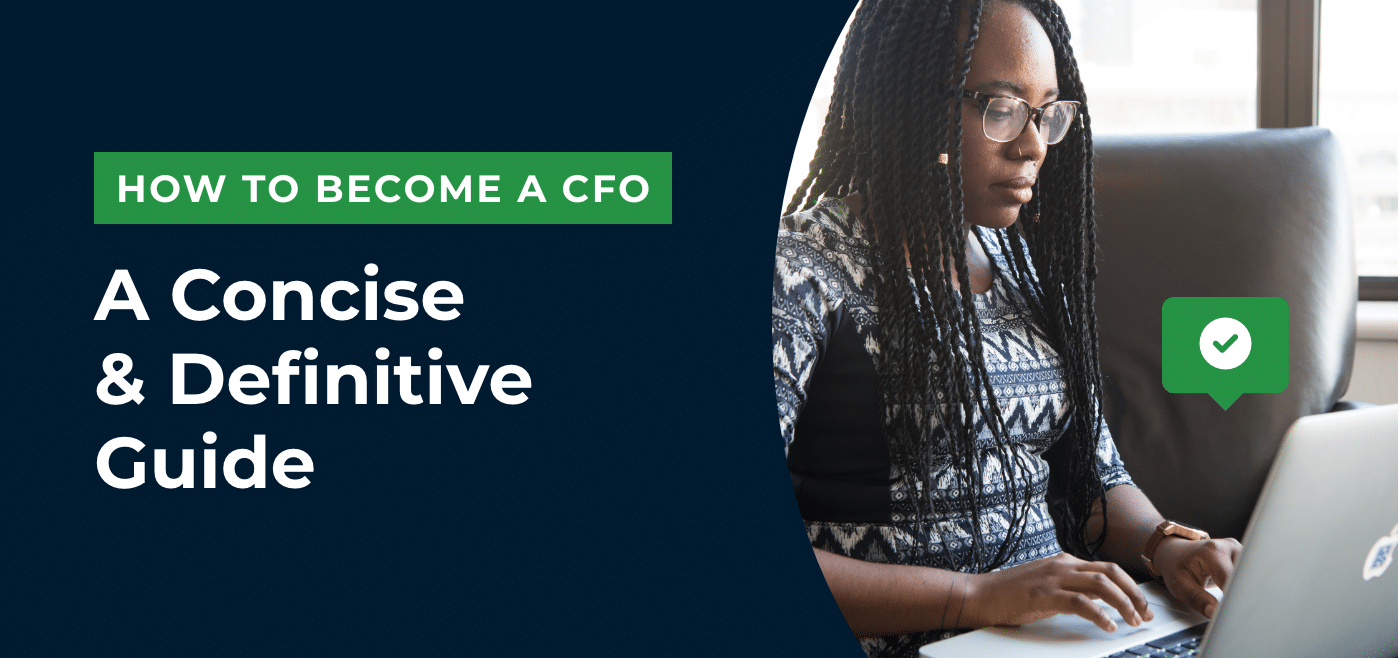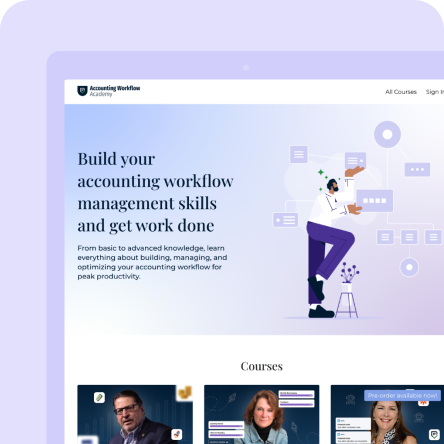Moving from crunching numbers to shaping an organization’s financial destiny as Chief Financial Officer (CFO) is a significant career leap. It comes with a different job description and bigger expectations than leading an accounting firm.
But this role is often the ultimate destination for accounting and finance professionals. Imagine the feeling associated with leading a company’s financial strategy and decision-making. Not to mention all the other high financial perks and benefits of the position. It’s no wonder so many people desire the job.
In this comprehensive guide, we cover how to become a CFO. You’ll learn the qualifications and skills you need. Alongside insights, strategies, and practical advice to help you in your journey.
Who is a CFO?
A Chief Financial Officer is a top-tier executive responsible for managing all financial operations and strategy in an organization. The position is often the highest-ranking financial one, and the holder works with other members of the C-suite (CEO, COO) to support the company’s growth.
The role of a CFO is multi-faceted, dynamic, and varies across different companies. However, Deloitte categorized the modern CFO role via a framework they developed called the “Four Faces of the CFO.” These “faces” include the strategist, steward, operator, and catalyst.
- Strategist: As a strategist, the CFO contributes to shaping a corporation’s future direction. They participate in operational discussions and provide insights (from a financial perspective) to guide business decisions.
Furthermore, they steer capital and risk management to fulfill strategic goals while handling risks that exceed acceptable levels.
- Steward: The steward is in charge of the company’s financial well-being and integrity. This includes preserving assets, minimizing risks, overseeing accounting functions, developing controls, and ensuring the company meets all regulatory requirements.
In essence, in this role, the CFO maintains the firm’s economic foundation, laying the groundwork for future growth.
- Operator: The focus of the operator is efficiency and effectiveness of the finance function. Here, they manage day-to-day financial operations, divide resources, develop talents, improve processes, and handle taxes. Executing operational tasks with success supports the more strategic aspects of the CFO role.
- Catalyst: A catalyst is something that encourages progress or change. In this context, a catalyst CFO drives company-wide change. This means they’re in charge of executing strategic choices, changing behaviors, and establishing a value attitude. They partner with other executives to improve business performance and set performance metrics for measuring strategic initiatives.
What are the responsibilities of a CFO?
The responsibilities of a CFO are extensive due to the importance of the role. Here are some of what you’re expected to take up.
Direct Financial Planning
Financial planning is a comprehensive process involving developing strategies to manage resources, measure performance, and promote sustainable growth. It’s not a one-time thing; instead, it’s an ongoing process needing evaluation and adjustment. This skill is a must-have for CFOs, as every business — regardless of their size — needs it to succeed.
Perform Risk Management
Another task a company will expect you to perform as a CFO is risk management. This means identifying and evaluating risks that can affect them. Then, developing strategies to manage these risks. You’ll also need to track the effectiveness of your risk management strategies and communicate any important risk-related information to the key stakeholders.
Decide on and Implement Investment Strategies
It’s your responsibility to make investment decisions with the resources available. But before investing in any scheme, assess the opportunities to choose the ones that can generate strong ROI.
You’re also in charge of managing the portfolio, evaluating performance, and providing investment reports.
Collaborate With Vendors
This is a significant responsibility. It involves managing relationships with vendors to fulfill the business’s financial needs. Examples of vendors are banks, insurance providers, service providers, suppliers, payroll providers, and consulting firms.
As CFO, you will take part in vendor selection, negotiating with them, monitoring their performance, and maintaining the relationship.
Manage Team
The CFO is the head of the finance team. As such, they must know how to lead their team. Team management covers recruiting top talents, fostering a collaborative culture, investing in team members’ well-being, motivating them, and resolving conflicts.
Study Trends And Forecast
Who is better suited to study market trends and predict the financial future than the CFO? It is your duty to develop forecasts to help your organization plan for the future. These forecasts form the basis for budgeting, decision-making, resource allocation, and strategic planning.
Oversee The Preparation of Financial Statements And Reports
Reports are essential for assessing a business’s financial health. So, another responsibility of the CFO is reviewing these reports to ensure they are accurate and compliant with accounting standards like Generally Accepted Accounting Principles (GAAP) or International Financial Reporting Standards (IFRS).
Ensure Legal And Regulatory Compliance
Finally, you must ensure economic operations are in accordance with the law and even internal policies. To do this, you’ll need to understand the relevant laws and regulations your company should abide by. These regulations are ever-evolving, so stay up-to-date.
You may be interested in
How to Become a CFO
The path to transitioning from an accounting role to CFO requires a combination of additional skills, experience, and qualifications.
- Education and qualification requirements
- Essential skills and competencies
- Gaining relevant work experience
- Be on the lookout for leadership opportunities
- Networking
- Build a comprehensive resume
1. Educational And Qualification Requirements
The basic educational need for most positions is a bachelor’s degree in fields like accounting or finance. Some firms even require more advanced degrees like a Master of Science in Finance (MSF) or a Master of Business Administration (MBA).
Aside from an educational background, it’s also beneficial to have industry-specific certifications. They give you an advantage over other candidates. Such professional certifications include Association of Chartered Certified Accountants (ACCA), Certified Public Accountant (CPA), Chartered Financial Analyst (CFA), and Certified Management Accountant (CMA).
2. Essential Skills And Competencies
CFOs need to have certain hard and soft skills like financial acumen, strategic thinking, problem-solving, leadership, people management, time management, communication, and flexibility.
To develop these skills,
- Never stop learning. Develop yourself by attending industry workshops, seminars, and webinars. Take online courses to increase your knowledge. Also, attend conferences about leadership, strategic thinking, and other soft skills.
- Request for feedback. Ask for feedback from your managers or peers on your performance. Then, work on the problem areas identified.
- Get a mentor. Seek guidance from CFOs or an experienced executive in similar roles. Their advice will help improve your skills.
- Take on diverse roles. Don’t stay confined to your current position in your firm. Embrace different responsibilities, like performing other duties aside from the ones you’re familiar with. This will help you become a well-rounded professional.
3. Gaining Relevant Work Experience
The career progression path to becoming a CFO from owning an accounting firm is as follows:
First, broaden your knowledge. If you’ve only been working with clients that need basic accounting services, expand your offerings. Take on more clients who need advisory, consulting, and controller services. This will help you gain experience in expected CFO duties.
Next, consider pursuing an advanced degree like an MBA or MSF to deepen your business acumen.
If possible, apply for financial leadership roles like VP or Director of Finance (to develop your skills further) before going after the coveted CFO function.
4. Be on the Lookout For Leadership Opportunities
As explained earlier, leadership takes up a significant part of a CFO’s duties. You probably have an idea of how to lead well if you’re a firm owner. To improve on the skill, take on more challenging projects, mentor younger accountants, and take on more leadership roles in extracurricular settings.
5. Networking
Networking might seem like a buzzword, but it isn’t. Instead, it’s a great way to advance your career. So, work on building and maintaining relationships with professionals in the industry. It could open doors to opportunities you may not have known of otherwise. Do this by joining professional associations, attending industry events, and interacting with thought leaders or associates on platforms like LinkedIn. And don’t neglect to leverage your existing network gained from working with many companies. Speak to your present or past clients. They might help with the connections you need to land the role.
6. Build a Comprehensive Resume
Last but not least, to become a CFO, create a resume deserving of the role. Make sure it highlights your finance and leadership experience, capabilities, and achievements effectively. In addition, tailor it to reflect key skills such as strategic thinking, financial expertise, leadership, communication, and risk management.
Here are some tips for your resume to maximize your chances:
- Use action verbs: Strong active (not passive) verbs add power to a resume. Use describe your accomplishments and responsibilities as it adds power to the resume.
For instance, instead of saying, “I was responsible for preparing and analyzing financial statements,” use an action verb like “I prepared financial statements.” This highlights your direct involvement in the task.
- Include practical examples and not just duties: Quantify your achievements where possible. Following our example above, don’t say, “I prepared and analyzed financial statements and reports.” Go one step further by saying, “I prepared and analyzed financial statements and reports, identifying cost-saving opportunities and implementing strategies that resulted in a 10% reduction in operational expenses.”
This approach proves your capabilities and makes for a more compelling resume. Use statistics, numbers, or percentages to describe the work done in your examples.
- List your certifications: Do you have certifications like Certified Public Accountant (CPA), Chartered Financial Analyst (CFA), Certified Management Accountant (CMA), Chartered Global Management Accountant (CGMA), or Certified Treasury Professional (CTP) List them and any others you might have.
- Make your resume Applicant Tracking System (ATS) friendly: An ATS-friendly resume is one optimized for the right keywords. So, include specific terminologies from the job’s description so the system won’t flag your resume. Instead, it’ll move you on to the next stage of the hiring process.
- Attach a cover letter to your applications: When submitting your application, always send a cover letter — even if the description says it’s optional. An engaging cover letter provides additional context to your resume, thereby improving your chances.
Preparing for CFO Interviews
Before going for an interview, do the following.
1. Research the organization: Do a background check to understand what they do, who they serve, their culture, etc. Review any available financial statements to know their financial health and performance. Also, note any recent company news or updates.
2. Brush up on your financial knowledge: Businesses expect CFOs to have extensive knowledge of financial topics like capital structure, cost control, cash flow management, and compliance. Update yourself to avoid seeming clueless during the interview and ruin your chances.
3. Practice potential questions: Some questions come up in most CFO interviews, so it’s a good idea to rehearse answers to these questions.
Here are common questions interviewers might ask, with recommended answers.
Question 1: How have you improved the financial forecasting process at a past company?
Recommended Answer: As a firm owner, I’ve worked with multiple clients that have basic forecasting systems. For one of such clients, I led an initiative to implement a more advanced and automated forecasting system. It incorporated historical data and real-time inputs to deliver more accurate predictions. This resulted in reducing forecast inaccuracies by around 35%.
Question 2: How would you handle a situation where the company is facing a financial crisis?
Recommended Answer: During financial crises, it’s crucial to remain calm, carefully analyze the situation, and then act decisively. I would conduct a thorough analysis to understand the root cause of the crisis. Then, together with the management team, I would develop a recovery plan. This could involve cost-saving measures, reassessing our strategic projects, or securing additional funding. Communication would also be key during this time to ensure all stakeholders are informed of our approach.
Question 3: How have you demonstrated leadership in your previous roles?
Recommended Answer: Leadership, to me, is not just about directing teams but also about fostering an environment that encourages growth and innovation. As a practice owner, I lead a team of 30 finance professionals. I focus on providing them with opportunities for upskilling and taking on new challenges. This approach not only results in the team’s personal growth but also leads to better productivity and a more positive work environment.
Question 4: Can you provide an example of a strategic initiative you led that had a significant impact on a company’s financial performance?
Recommended Answer: In my last role, I led a cross-departmental initiative to reduce operational costs. I worked with various departments to identify areas where spending could be reduced without impacting productivity or employee satisfaction. As a result of this initiative, we were able to cut costs by 20% over 18 months, significantly improving the company’s financial performance.
Question 5: How do you stay updated with the latest trends in finance and regulatory standards?
Recommended Answer: Continuous learning is a critical part of being an effective CFO. So, I regularly attend industry seminars, webinars, and finance leadership forums. I also subscribe to relevant financial publications. This helps me stay updated with the latest trends in the industry.
Remember, body language is key when speaking. Understand the question, then answer calmly and confidently. Don’t fidget.
4. Prepare questions: Because it’s a two-way street, prepare a few insightful questions for the interviewer. Your questions should show you did your research and indicate your interest. Examples include:
- Can you tell me about the team I will be leading? What are their strengths and areas for improvement?
- What are the immediate priorities for the CFO in the first 6-12 months?
- How would you describe the company culture here, particularly within the finance department?
5. Get yourself ready: Confirm the details (location and time) of your interview. Dress appropriately, and be punctual. If it’s a video call, make sure your background and lighting are good enough.
You may be interested in:
How much does the average CFO earn?
Salary varies depending on the individual experience & education, the company’s size, industry, and location.
According to Salary.com, the average salary for CFOs in the US is $434,315, and the range is between $329,027 to $557,194. With bonuses, 50% of them earn $598,719. Total compensation (salary + bonuses + benefits) on average is as high as $735,348.
Land Your Dream CFO Job Today
Congratulations! If you’ve come this far, you’re well on your way to getting that amazing CFO job.
What next? Create a well-defined plan, and improve on it as time passes. Keep going despite any rejections you get (and you’ll get many). Remember, determination is key.
You’ve got this, and we’re rooting for you!





